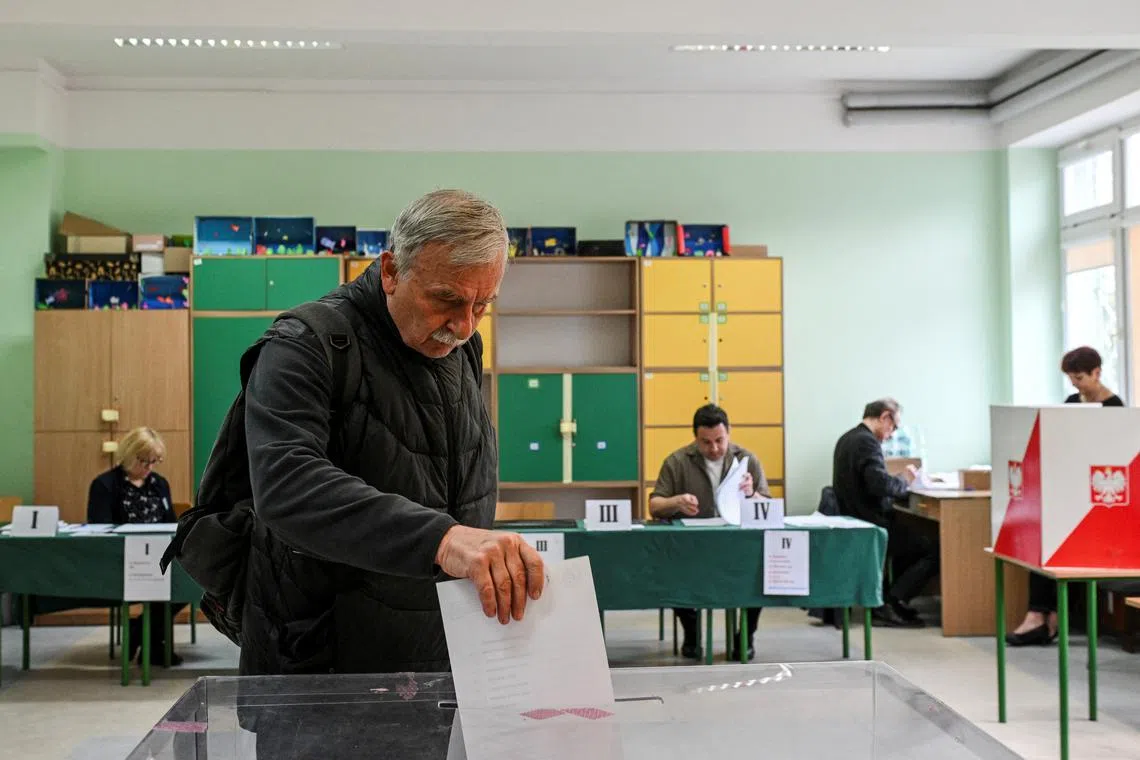Polish presidential vote tests whether PM’s European vision is Trump-proof
Sign up now: Get ST's newsletters delivered to your inbox

The Polish presidential election took place on May 18.
PHOTO: REUTERS
WARSAW - Poles were voting on May 18 in a presidential election that will decide whether Warsaw follows the pro-European path set by Prime Minister Donald Tusk, or take a step towards bringing back the nationalist admirers of US President Donald Trump.
Mr Trump’s return to power has energised Eurosceptics across Europe, and the May 18 ballot will be the sternest test of Mr Tusk’s pro-European vision since he came to power in 2023, ousting the nationalist Law and Justice (PiS) party.
The election pits Warsaw Mayor Rafal Trzaskowski, from Mr Tusk’s Civic Coalition, against conservative historian Karol Nawrocki, who is backed by PiS.
Mr Trzaskowski has been cast as the front runner, likely to face Mr Nawrocki in a run-off, due on June 1, if no candidate wins over 50 per cent. Media blackout laws forbid the publication of opinion poll results from early May 17 until voting ends on May 18.
Also competing are far-right candidate Slawomir Mentzen from the Confederation party, Parliament Speaker Szymon Holownia of the centre-right Poland 2050 and Ms Magdalena Biejat from the Left.
The Polish first round vote takes place on the same day as a second round presidential run-off in Romania, where Mr George Simion, a nationalist who campaigns to “Make Romania Great Again”, faces centrist Bucharest Mayor Nicusor Dan.
A victory for two Eurosceptic candidates would send shock waves through the European Union at the bloc grapples with the twin challenges of Russia’s invasion of Poland’s eastern neighbour Ukraine and Mr Trump’s tariffs.
Polls in Poland opened at 7am and close at 9pm. Around 29 million people are eligible to vote.
The Polish president has limited executive powers but can veto legislation. That has allowed outgoing President Andrzej Duda, a PiS ally, to stymie efforts by Mr Tusk to undo judicial changes implemented under the PiS, which Mr Tusk says hamper democracy.
Mr Trzaskowski has pledged to cement Poland’s role as a major player at the heart of European policymaking and work with the government to roll back PiS’s judicial changes.
‘End the chaos’
“I would definitely strengthen relations with our partners... within Nato and the EU,” he told state broadcaster TVP Info on May 16.
“I will also ask lawmakers to give me the Bills Duda vetoed to sign... I also hope that we will end the chaos in the justice system that PiS left us.”
Mr Nawrocki’s campaign was rocked by allegations, which he denies, that he deceived an elderly man into selling him a flat in return for a promise of care he did not provide. But Mr Trump showed support by meeting Mr Nawrocki in the White House.
Mr Nawrocki casts the election as a chance to stop Mr Tusk achieving unchecked power and push back against liberal values represented by Mr Trzaskowski, who as Warsaw mayor patronised LGBT marches and took down Christian crosses from public buildings.
“The cross that my opponent took down in Warsaw... 1,000 years of heritage of the Polish state, is our strength, is our energy,” he told a rally in the eastern city of Lublin.
Unlike some other Eurosceptics in central Europe, Mr Nawrocki supports military aid to help Ukraine fend off Russia. However, he has tapped into anti-Ukrainian sentiment among some Poles weary of an influx of refugees from their neighbour.
He has said Polish citizens should get priority in public services and criticised Kyiv’s attitude to exhumations of the remains of Poles killed by Ukrainian nationalists during World War Two. REUTERS


